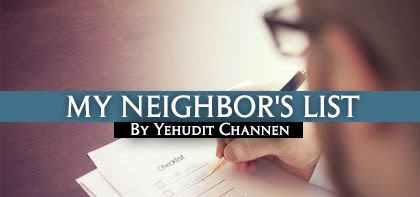
My Neighbor’s List
I stood there staring at the list. It looked like a bizarre recipe for a voodoo doll. I was shocked. How dare they keep track like this? How stingy! Why are they being so rigid?

Last night one of my neighbors told me she was having a new air-conditioning unit installed. She was nervous about the huge mess this would make right before the holidays. The installers warned her that there would be dust everywhere.
“Do you want to borrow some plastic tablecloths?” I offered in my helpful neighbor voice.
“Actually,” she said, “I think you owe me two.” Slightly embarrassed, I went directly to my cupboard, pulled out two tablecloths and handed them to her with an apology. I walked her back to her apartment and her husband opened the door. “Yehudit just gave me back these two tablecloths” she said.
He paused. “I think she owes us three.”
“Thank you for telling me” I said stiffly. “Please don’t ever hesitate to remind me if we owe you guys anything.”
“There’s a list behind the kitchen door” he said. “You can read it for yourself.” Shocked, I turned into the kitchen and saw a whiteboard with a list:
- 6 eggs
- 1 cup white vinegar
- 3 tablecloths
- 1 envelope
- 3 candles
- 1 margarine
- 1 baking pan
I stood there staring at the list. It looked like some bizarre recipe for a voodoo doll. I was shocked. How dare they keep track like this? How stingy! Why are they being so rigid? They also borrow stuff (though 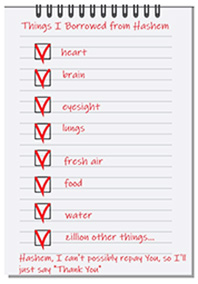 not as much) and I never give a hoot if they pay me back. I lived on a settlement for 18 years and we borrowed constantly (there was no store) and if we had been this exacting we would have needed a professional accountant.
not as much) and I never give a hoot if they pay me back. I lived on a settlement for 18 years and we borrowed constantly (there was no store) and if we had been this exacting we would have needed a professional accountant.
And why hadn’t they mentioned to me that they write down everything I borrow? This behavior is just not Jewish! My gavel slammed down on the wood.
I went home and within minutes I put together most of what I had borrowed over the year. I couldn’t find an envelope to save my life but who has envelopes just lying around their house (except for my neighbors who usually have everything you could ever need)? I cringed, thinking of all the thumbtacks they loaned us every Sukkot.
Anyway, after I had self-righteously (and quite regally I might add) returned the items written on that stupid whiteboard, I sat down and thought awhile. I knew that I had worked myself up into a victim state and I hate when that happens. I am totally against the victim script and have worked on myself for years to extract it from my psyche. I remember telling my kids when their sulking would go on for too long, “You are not a miscayne (which is Hebrew for nebbuch, which is Yiddish for “you poor ole thang”, which is southern for victim, which all means that somebody done you wrong and life is just not fair and how will you ever cope and you should throw yourself a pity party with drinks all around). After the party you are then free to hate the perpetrator of the crime against you and be cold to them for the rest of your life. As a victim you have the perfect excuse to eat compulsively, go on a shopping binge or smoke a bunch of weed. You also have the option of yelling at your spouse, withdrawing from your kids and collecting one more stamp against humanity. And don’t forget revenge! No mishloach manos for them!
So there’s a lot you can squeeze out of being a victim. Why would you ever give it up?
The answer is that living life as a victim makes you a sour person. It builds a “me vs. them” mentality that will eventually isolate you, even from your loved ones. When you choose to feel like a victim you are choosing to react to life rather than respond to it, and there’s a big difference. When we understand that everything comes from God, who loves us madly and that He is sending us messages through other people, we can take any interaction and make it positive in some way. We can choose to have an eyin tov (a good eye), which means we see the good in people and assume they are not out to intentionally hurt us.
So I made my own list:
- My neighbors are very organized and are quick to repay me when they borrow something. I can learn from them to be more organized and prompt.
- Truthfully, it is my responsibility to remember what I borrow. I should keep a list.
- Hashem also keeps a list and I should make sure I have paid my debts.
- How patient my neighbors have been never to mention until now the things that I owe them.
- I resolve to be more conscientious in the future.
After making this list I felt much better. My fond feelings for my neighbors came back and I felt relieved that I had returned everything on the list. Well, almost everything. I don’t have to be perfect. Anybody got a manila envelope?
Editor’s note: Halacha requires that we either give something as a gift or keep a list and return it to the exact amount, so that there won’t be a question of interest by giving back too much, or “gezel”, stealing, by giving back too little. What’s more, halacha actually requires borrowing anything with 2 witnesses and a promissory note, calling failure to return loans as “gezel”. So we do have to be especially careful about returning what we borrow, whether money or an object.





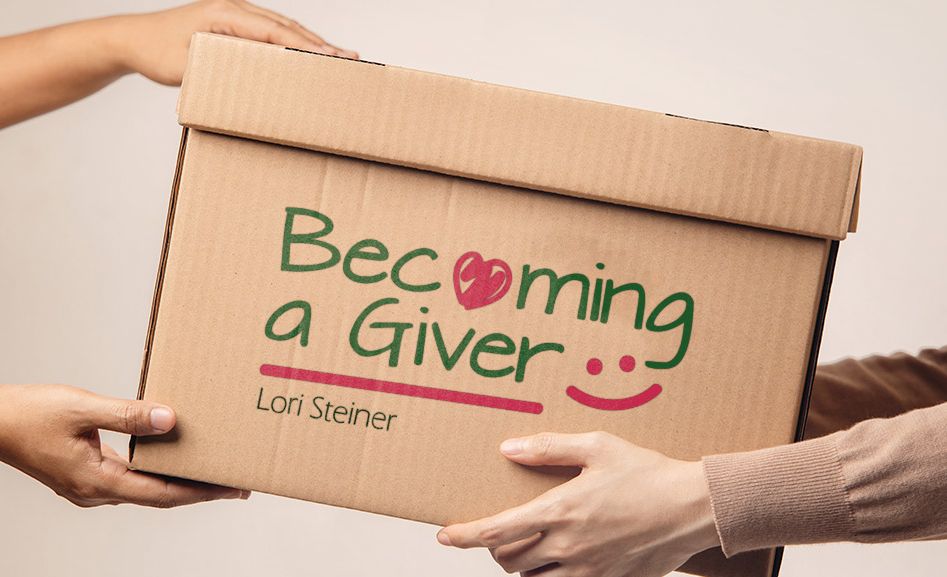



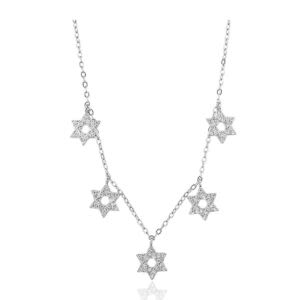
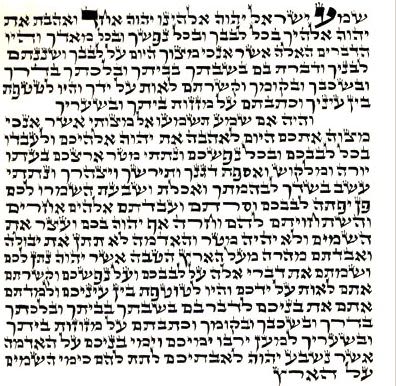
Tell us what you think!
Thank you for your comment!
It will be published after approval by the Editor.